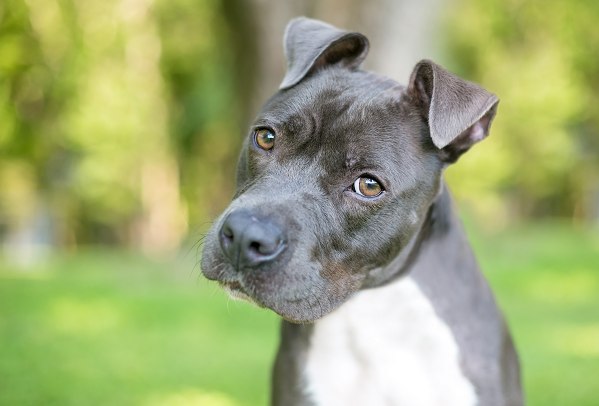
Humans have five recognized senses. We taste, touch, smell, see, and hear. Dogs have the same five senses, but they aren’t all the same as ours.
- Humans can discern a broader color spectrum and more visual detail than dogs, because we have more color-detecting cells (cones) in the eye.
- Dogs see better in the dark than humans, because they have larger pupils that let in more light, and more light-sensitive cells (rods) in the center of the retina. Dogs can also detect tiny movements that we may miss, making them good hunters – especially at night.
- Dogs have a great sense of smell. Their noses function about 10,000 times better than ours do.
- Humans have a better sense of taste than dogs. We have about 9,000 taste buds compared to about 1,700 in a dog.
- Dogs can hear much higher frequencies than humans and can hear at much longer distances.
What is a “sixth sense”?
While dogs have five remarkably good senses, some people think they also have an elusive “sixth sense”. What is a sixth sense, anyway? Can it really be defined?
People usually think of a sixth sense as intuition or a “gut feeling”. Is it an additional sense or an increased sensitivity to the information provided by the other five senses? There’s no clear answer, but anecdotes involving the “sixth sense” are quite interesting.
Sensitive Examples
Human mood: Many pet owners know that dogs are quite intuitive. When we are happy, our dogs may be equally exuberant. When we are sad, our dogs try to comfort us. Ever sit on the sofa in serious contemplation and have your pooch nestle beside you? Our furry friends seem to know what we need, but how? Humans produce hormones such as oxytocin, serotonin, and dopamine that rise and fall with our moods. Perhaps dogs sense these hormone levels. Or perhaps they notice our facial expressions, voice, body language, or smell. Some might say this increased perception is a sixth sense.
Human illness: A dog’s keen sense of smell enables them to “sense” some human illnesses. Dogs can be trained to detect specific volatile organic compounds (VOC) in humans that indicate ongoing illness, helping detect lung cancer by smelling a person’s breath or bladder cancer by smelling their urine. Dogs can also predict low blood sugar by detecting VOCs emitted through the skin or predict a seizure by recognizing changes in VOCs, pupil size, and demeanor in a patient with epilepsy.
When a dog’s sense of smell is coupled with their ability to read their owner’s mood, they are quite adept at predicting health problems and preventing injury. Is this a sixth sense or just a superhero dog?
Weather: According to an Associated Press poll, two thirds of pet owners think their pets have a sixth sense about weather. In this case, their sixth sense is likely due to their heightened senses – dogs can hear, smell, and feel weather activity, giving them a predictive edge on humans.
- Dogs have an acute sense of hearing, which allows them to hear distant thunder before we do.
- Dogs can smell changes in the atmosphere (ozone) better than we do, so they may sense an oncoming storm.
- Dogs can detect changes in barometric pressure or electromagnetic fields that may be related to coming storms.
- Dogs have been known to detect changes in seismic activity and feel small movements before earthquakes occur.
Who needs a weather forecaster when you have a dog?
How can you sense your pet’s sixth sense?
We may not be as sensitive as our dogs, but even mere mortals can recognize when a dog’s sixth sense is on the job. A dog that detects oncoming bad weather may pace nervously, whine, hide, bark, or seek out their owner. A dog that notices changes in their owner’s mood may cuddle up next to them or beg to be petted. Dogs that detect illness may lick the owners incessantly and stay closely by their side. Your own dog can be a service dog that alerts you to things you can’t see or perceive.
Your dog knows you. Pay attention and you may be surprised at how intuitive he is. Even though there is no scientific evidence for a dog’s “sixth sense”, we certainly have sense enough to appreciate our dogs’ abilities and how they integrate their other five senses in an amazing fashion.

